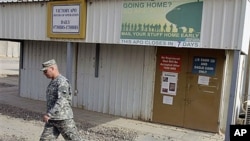Friday’s White House announcement of a full withdrawal of U.S. troops from Iraq raises many questions about the future of the country and the U.S. military presence in the Persian Gulf.
For months, the United States military awaited Iraq’s decision with some anxiety, as expressed by Defense Secretary Leon Panetta on a trip to Iraq in July, soon after assuming his post.
“I’d like them to make a decision. Do they want us to stay or don’t they want us to stay? They want to get a minister of defense or don’t get a minister of defense, but dammit, make a decision,” said Panetta.
In the end, that decision was not what some in the U.S. military had wanted.
For days there had been indications of snags in the negotiations between the U.S. and Iraqi governments, primarily over Iraq’s refusal to grant immunity to U.S. soldiers.
U.S. commanders in Iraq have been saying they believe Iraqi security forces have been trained well enough to defend the country against external threats, but continuing sectarian violence and the threat of Iranian intervention raises questions about the future stability of Iraq.
Anthony Cordesman is a security analyst with the Center for Strategic and International Studies. He believes the failure of the U.S. and Iraq to reach an agreement on a U.S. troop presence is a troubling development.
“It may be ingenuous or false to present it as a success, but the reality is that it’s not clear any administration could have negotiated the kind of outcome we wanted,” said Cordesman.
The U.S. had hoped to leave several thousand troops behind in a non-combat role, in which they would train and advise Iraqi security forces. Cordesman said not having thousands of troops stay behind may result in a dangerous power vacuum.
“Now we’re going to have zero, which means there won’t be forces to help maintain checkpoints between Kurds and Arabs. There are not going to be specialized forces to help the Iraqis deal with the kinds of terrorism and insurgent groups they have. We’re not going to have any clear contingency basing structure that will allow us to rapidly deploy if Iraq faced a threat from Iran,” said Cordesman.
U.S. troops have been withdrawing for months and fewer than 40,000 remain in Iraq of the approximately 100,000 that were there at the height of the war. All of them are scheduled to leave the country by the end of the year and return to their home bases.
A small number of U.S. military personnel is to remain to protect the U.S. embassy.
With a major platform disappearing in the region, analysts say the United States will now have to rethink its posture in the Persian Gulf and how it will reposition its forces to safeguard oil supplies and maintain stability.
US Withdrawal Raises Questions of a Vacuum in Iraq
- By Luis Ramirez




